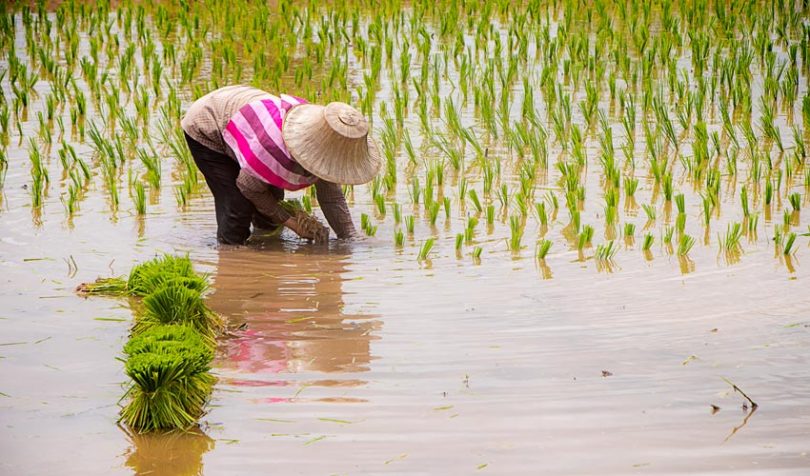On 23 July 2020, Schuttelaar & Partners (SP), a communication consultancy firm focused on health and sustainability, and Amru Rice, a leading exporter of rice in Cambodia, held a live stream in which they presented the results of their project, BlocRice. In 2018, BlocRice began its pilot stage, involving more than 50 farmers. In 2019, the project, which includes Oxfam Novib, was upscaled to a commercially viable level, adding more farmers and introducing direct links with consumers. While solutions that use blockchain for food traceability have become increasingly popular due to higher consumer demand for health and sustainability assurances, BlocRice focuses on the farmer, and in particular, the impact of poverty on their human rights.
Cambodian rice farmers struggle to reach the average living income wage, facing a multitude of hurdles such as small areas of farmland, soil infertility owing to poor irrigation, and old-fashioned farming methods of farming. Further income impact is due to little to no access to information and a long, international supply chain. According to SP’s research, the gap between the desired living income benchmark of €4500 and the actual income is -31%. This is where the BlocRice project endeavors to help in boosting the transparency in the international value and supply chains to improve the livelihoods of Cambodian rice farmers.
Amru Rice hopes to create three apps using blockchain technology, the first targeted towards farmers who will be able to sell their rice directly to online sellers, track their yields as well as track their achievements. The second is targeted to supply chain participants. This app will be focused more on analyzing, tracing and logistics, as well as transaction forecasts. The third is for consumers, who will be able to see the product’s life cycle, the full supply chain, and the prices for each transaction between the various supply chain actors.
Considering the amount of other external factors that impact farmer income, merely shortening the supply chain by eliminating certain intermediaries’ roles may not be enough. The BlocRice project claims to have another strategy to tackle these problems. Firstly, they aim to improve the income from the rice itself. Secondly, to improve the income from other farm sources (such as pulses or fruit) and to use intercropping methods to improve agricultural yield. Thirdly, to reduce the costs by strengthening the cooperatives, and strengthening the structure of the saving and loan groups. In this, BlocRice hopes to focus on farmers’ training and management, and in particular, training female farmers in leadership.
Other blockchain solutions for rice traceability include Swiss startups Rice Exchange (Ricex), which partnered with Fujitsu, and projects in Thailand and China.






